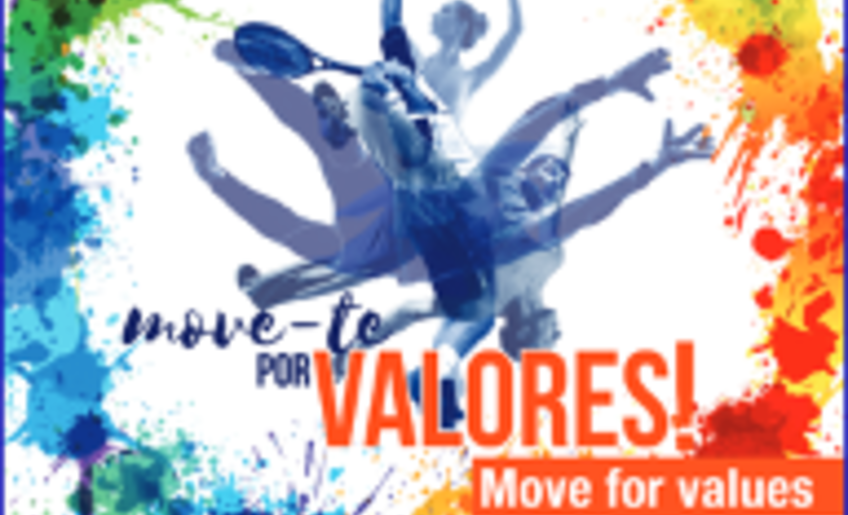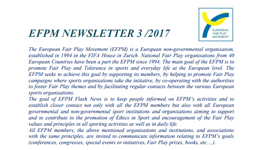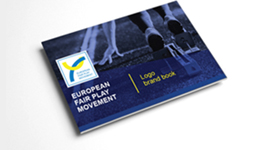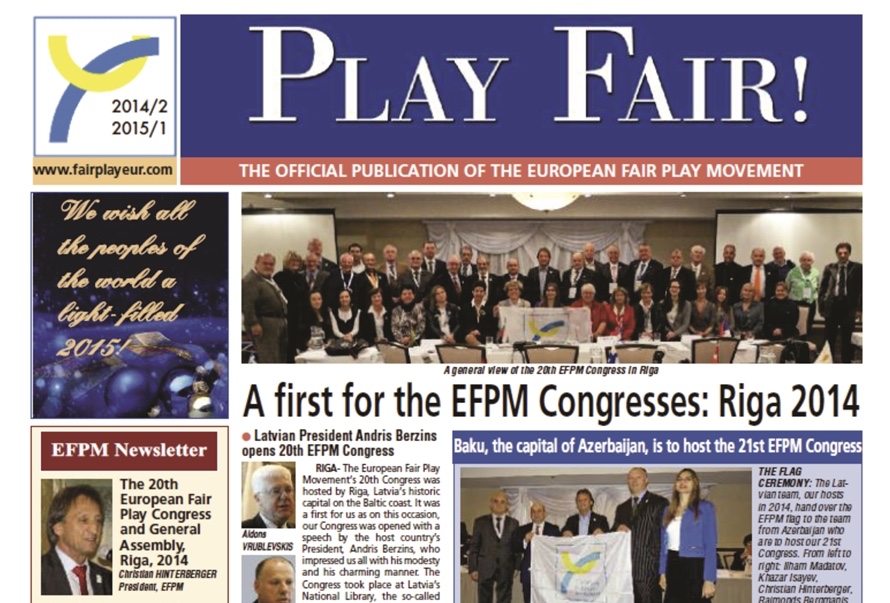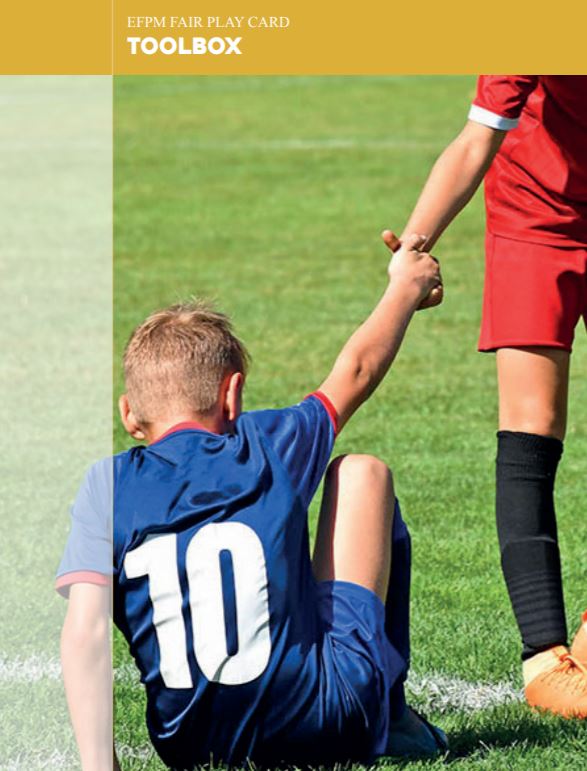THE APPROACH AT THE STATE LEVEL TO THE PROMOTION OF A NATIONAL FAIR PLAN STRATEGY IN PORTUGAL
I am pleased to release the second major case study in our best practise research project into the evaluation of the effectiveness, and impact of the fair play green/white Card.
The first case study involved an in depth look at the application of the card at the CSIT world games with thousands of participants which found that the card was effective in raining awareness of fair play in the participants. This was evidenced through questionnaire surveys of officials and players, both those who received a card award and those who did not.
This, the second case study is at the national level within a state sports policy setting in Portugal. Using similar methodology to the first study to look at the impact of the use and application of the fair play card through the eyes of the actors involved in it.
The approach at the state level to the promotion of a national fair plan strategy and action plan with a range of positive initiatives is in itself worthy of study and as a role model for other nations. The resources available to underpin the management of the card and the underpinning pedagogical theories are worthy of further study
The application of the fair play, “white card” in Portugal, evidenced by two football associations had found that the introduction of the white card had a direct impact on fair play, with one stating that the number of disciplinary occurrences in games and tournaments had reduced over the period. The other stated they had a number of situations where the award of a card had changed the behaviour and attitudes of those in the games.
The final case study is to be of an individual sports federation, and the case of Mamanet is underway at the moment.
The final paper with a comparison of the three case studies, other instances of application of the card, and the underpinning behavioural change models will be completed by the Autumn 2020.
Finally, a suite of transferable documents, templates and protocols will be produced to promote the use and application of the card by all partners, as a major tool for the EFPM.
EFPM “FAIR PLAY (GREEN/WHITE) CARD” RESEARCH PROJECT
Case Study 2
The Portuguese Institute of Sports and Youth and the National Plan for Sports Ethics
1. Background
The first case study in this project to evaluate the use and application of the fair play card (green card) was in a large multi-sport tournament style event, this the second study is at the national level with a state sports policy setting. It also seeks to use similar methodology to the first study to look at the impact of the use and application of the fair play card through the eyes of the actors involved in it.
2. Sports Policy in Portugal
2.1 The Portuguese Institute of Sport and Youth, (IPDJ).,
The Portuguese Institute of Sport and Youth, (IPDJ)., is a public institute. Its mission is to implement a integrated policy in the fields of sport and youth, in close co-operation with public and private organisations, namely with sports organisations, youth associations, students unions and local authorities.
The IPDJand National Plan for Ethics in Sport) were founded in 2012. Previously the Portuguese Institute of Youth and Portuguese Institute of Sports were two separate organisations (Sport / Youth) which merged in 2012 to form one national organisation. IPDJ has recently launched its new PORTAL (https://ipdj.gov.pt/) dedicated to sport and youth.
In Sport, the mission of the Institute is to support the implementation and evaluation of public policies for sport, promoting participation, as well the high performance sport through the provision of technical, human and financial means. The preservation of ethics in sport is also one of the essential purposes of IPDJ, IP. Through the National Plan for Ethics in Sport.
IPDJ also promotes volunteering and citizenship, leisure activities, non-formal education, information and geographical mobility of young people in Portugal and abroad, as well as tourism for young people, in particular with regard to the youth hostels network and the youth card.
At international level, and with the aim of exchanging experiences and sharing knowledge and results, IPDJ supports and integrates some networks and organizations with an interest in sectors of sport and youth, apart the European Union and the Council of Europe, such as the CPLP - Community of Portuguese Language Countries, the OIJ – Ibero-American Youth Organization, ICD – Ibero-American Sports Council.
2.2 Portuguese Sports Policy
The European Commission web site (2020) comments on the Portuguese
National Strategy for the Promotion of Physical Activity, Health and Well-being (ENPAF). 2016 to 2025
ENPAF arose within the context of the Consensus Meeting about Guidelines for the Recommendation for Physical Activity which was sponsored by the World Health Organisation Regional Office for Europe, through the Nutrition, Physical Activity and Obesity Programme. Its production was coordinated by the Ministry of Health through the Directorate-General of Health and featured contributions from a wide range of partners, including the Ministry of Education and the Portuguese Institute of Sport and Youth.
The National Programme for the Promotion of Physical Activity (PNPAF) was developed in 2016 to implement the ENPAF national strategy. This national strategy has a number of strands, including the promotion of elite sport, sport in schools, and mass participation promotion using the COM-B model and research and evaluation.
In order to facilitate intersectoral work and leverage the work at different partners, the Health Ministry created the Intersectoral Commission for Physical Activity Promotion (Order No. 3632/2017, 28th April), responsible for the creation and monitoring of the National Plan for Physical Activity Promotion. This Commission highlights the national best practices regarding physical activity promotion, including those targeting children and youth. PNPAF works together with the Commission and is involved in its coordination.
The IDPJ has many programs and a good example is the National Sports for All Programme (PNDpT) is a programme of the Portuguese Government operationalised by the Portuguese Institute of Sport and Youth, I.P. (IPDJ, I.P.) which intends to implement and operate a set of international recommendations, including the guidelines of the European Union Council, United Nations, World Health Organisation and the International Olympic Committee.
2.3 Ethics in sport
TheNational Plan for Ethics in Sport,approved in 2012, led to the book “ Move for Values “ which is a government initiative promoted by the Office of the Secretary of State for Youth and Sport, which the Portuguese Institute of Sport and Youth, I.P. is responsible for its management and funding.
It encompasses a set of initiatives that aim to disseminate and promote the ethical values in sports, notably the truth, respect, responsibility, friendship and cooperation.
Main Goals of the National Plan · Promote the theme of Sports Ethics among the population, especially children and youth;. · Enable a wide range of institutions, clubs, associations and schools to benefit from resources, facilities and activities, designed to ponder over Sports Ethics;. · Promote a set of reflections and activities within the community, so that sports values can be experienced and understood;. · Put the issue of Ethics in Sport on the agenda of the media;.
|
Despite being targeted at the entire population, it not only develops activities aimed at children and young people, schools, universities, but also teachers, parents, coaches, referees, journalists, and others.
PNED operates on 5 Strategic Axis: Training/Education; Sports/Events; Publications/Research/ICT; Competitions and Campaigns.
These goals rely on The Code of Sports Ethic for “Fair play in Sports”, from the Council of Europe, which is a statement of intention accepted by all the European Ministers responsible for Sports. This code assumes that ethical considerations that underlie fair play are not an optional item but something essential to any sports activity and which apply to all levels of competence in sports, from management to sports practice. It extends from leisure activities to professional competition, providing a solid ethical framework that helps to fight against the pressures of modern society which are threatening the traditional sports foundations such as fair play, sportsmanship and volunteering.
In the context of its activities, the following, among others, stand out:
Proposal for ethics and values in the physical education curriculum (2016)
A proposal that offers a set of teaching strategies in order to help the operationalisation of the values in/of sports, according to the pedagogical guidelines defined in the physical education curriculum and in the physical-motor expression.
Internship Centre of Values in Sport
A mobile pedagogical resource (caravan) available to go to schools, clubs and sporting events, or others.
Comics "As Aventuras de Splitez"
5 comic book stories that approach the themes of bullying, discrimination, balancing the academic life with sports, individualism and doping in sports.
A campaign that started in 2016 targeting the prevention of Bullying in Sports, with the collaboration of the Faculty of Human Kinetics- University of Lisbon (FMH-UL), in the form of an informational/educational/preventive brochure against Bullying, called "Cartão Vemelho ao Bullying (Red Card to Bullying)". It is promoted and funded by the Portuguese Institute of Sport and Youth.
This is a research-action project that arises in 2017 following the Red Card to Bullying project, in a partnership between the Portuguese Institute of Sport and Youth (IPDJ) and the Faculty of Human Kinetics and a wide range of other entities and ambassadors.
The project aims to raise awareness of educational and sporting communities about bullying in sports training, and its intervention is structured in 3 strategies: creation of tools, training of trainers and specialized intervention in clubs.
This project has a website with information about bullying in sports according to the person that it is addressing - "Who are you in this game?" - Family, Trainers, Aggressor, Victim or Observer.
Sessions of Awareness-Raising "Ethics in Sports"
Intervention in educational establishments, from primary education to secondary education, with the goal of stressing the promotion of rights and responsibilities through the importance of values, like, for instance, respect and tolerance, in sports and in life. Presentation of testimonials by regarded persons of recognised standing related to sports, illustrative of inspiring careers.
Competitions
PNED promotes several competitions in partnership with agencies such as the Sports Journalists association with the aims of contributing to the education of (importance of values in sport), and awareness of journalists, investigators etc. Other examples are set out below.
Literary Competition "Ethics in Life and Sports"
Activity in the range of education for citizenship that intends to encourage the production of written assignments, by secondary education students (special attention given to students from educational centres and detention facilities), related to Ethics in Life and Sports, giving emphasis to the importance of assimilation and dissemination of values. Promoted by the Portuguese Institute of Sport and Youth, in partnership with the Directorate-General for Education/School Sport, Directorate-General for Reinsertion and Prison Service, Sport Foundation, Sports Newspaper A Bola, Regional Directorate for Sport of the Government of Azores, Regional Secretariat for Education of the Regional Government of Madeira.
Pedagogical Resources
Also, teaching resources are available in the website of PNED targeted at the community in general (Educators/Teachers, Parents/Guardians, children and young people, different sports agents, among others). The academic and theoretical underpinning of the project are set out in Appendix 1.
Ethics Flag - It is a certification process of ethical values in sport, aimed at clubs, schools, projects or any other type of initiatives and entities that want to see their work recognized and certified in the promotion of ethical values through sport. It is also intended through this project to implement a process that identifies and promotes good practices, while ensuring a flexible and useful methodology for all types of agents
 The Ethics Flag or “kitemark”
The Ethics Flag or “kitemark”
White/Fair play Card - The white / fair play card is a card that aims to recognize, highlight and reward ethically relevant attitudes and behaviour of practitioners, coaches, managers, among other agents directly involved in the game, as well as spectators. It is a pedagogical card
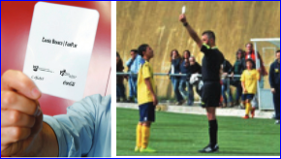
3. Implementation and Impact of the White Fair Play card. – The subject of this case study
The card initiative has been designed primarily as an educational card, that will be shown in recognition of the practical attitudes of sportsmanship and respect for values and ethics in sport.
The referee will be seen as someone who values the fair play and not only someone who applies sanctions.
After careful consideration the organisers came up with the white colour to align to the idea of sport for peace, though the green card was debated. The card was subject to a pilot in 2014/15 within three sports, Skating, Handball and Soccer focused on 6 to 14-year olds.
The fair play card has been adopted, through it being part of the National Sport Ethics Plan (PNED) by a significant number of Governing Bodies of sport (sports Federations) as well as non-profit organisations, municipalities (local authorities) etc
The main sport to take up the card has been football and the initiative sits well alongside the EUFA “Respect” programme.
The purpose of these initiatives to promote Fair Play is to encourage sportsmanship as well as the chivalrous behaviour of players, coaches, managers, sports agents and spectators to increase the pleasure of all of them in the game.
3.1 How is the PNED white fair Play card administered and who can nominate?
Purpose
The White Card can contribute to the reduction of disciplinary occurrences, it can help to reduce the existence of unfavourable sports environments, can contribute to enhance the role of the referee / judge (not only someone who penalises, but also the that praises), etc.
Delivery
Distribution and use of the card is managed through the IDPJ, which provides the following resources –
See http://www.pned.pt/recursos-pedagogicos/cartao-branco.aspx
- Application form for organisations to use the card
- Approval and distribution system for actual white cards
- A supply of cards
- White card standards and criteria covering for example when the card can be shown, and by whom.
e.g. The display of the card to a player/team undertaking a worthy act will be made soon after the game has been stopped for any reason within the laws of the game. The display to the spectators, when deserved, can also be done at the end of the game
- Match recording sheet
- An FAQ
- A website
- Promotional materials
- Guidelines for coaches
- Guidelines for teachers
Who can award cards?
Any entity that promotes sporting activities (e.g. federations, clubs, municipalities, non-profit associations and others) can award the cards, provided they have registered. Any club within a governing body can award cards according to the regulations.
What can a card be given for? -What are the criteria?
The card can be given to players, teams, officials, spectators for the following circumstances -
- Sincerely apologizes to the opponent and showing regret, after having misconduct.
- Acknowledges publicly and with dignity an infraction (an offence under the laws of the game) he has just committed, helping the referee to control the game.
- Restores the truth in a public and voluntary way if the referee has made a mistake, helping him to clarify dubious situations.
- Helps an opponent in a situation where he urgently needs help.
- Respects the most dubious decisions of referees and / or judges
- Animates and encourages teammates when they fail at decisive moments of the game.
- Treat the various agents in a respectful and friendly manner, even when provoked, ensuring the well-being of all
- Recognizes the opponent's value and congratulates him following a major move, raising the spirit of the game.
- Maintain humility and magnanimity in victory
- Checks that there is a problem with the opponent's sports equipment and makes theirs (or the club's) available
- Take the initiative to face each other even when regulations and code of conduct benefit you
- Demonstrates a set of important values for life, on and off the field
- Promotes a healthy atmosphere with opponents, before and after the game
- Integrates and sets a good example (conduct) for the youngest
The manager, coach, or trainer is worthy of display of the fair play card when there are the following behaviours or similar: -
- respectful to officials at all times, and likewise, their athletes and opponents; -
- encouragement to their athletes to help opponents whenever those needs; -
- respectable to their peers, leaders, spectators and other staff; -
- Promotes game balance if it finds that there is a lower number in the opposing team for reasons of force majeure;-
- Maintain humility and magnanimity in victory; -
Spectators can receive the card when -
- They express a good personal and sporty relationship with each other and other sports agents
- Supports good and positive fair play from both the teams.
Promotion
Once organisations have become a member they should recognise that it is important to outline measures to promote the White Card to their sports community (website, posters, awareness-raising actions, etc.), as well as disseminating it (for example, if the White Card is shown to an athlete, visibility should be given to that occurrence, for example, with the region's media). Therefore, there must be an internal plan to disseminate and promote the relevant acts of fair play in that sport or community.
Affiliated organisations should create incentives is a way for the entity to show that it values ethical behaviours and that the display of the White Card can contribute to these.
Monitoring
Each season the affiliated organisation must send to the coordinator for PNED an annual return with details of the use of the card.
4. Research by EFPM
4.1 Methodology
In order to gather both quantitative and qualitative data across this international dimension two main techniques were used: -
A dialogue by email with the main organisers.
A questionnaire survey with one aimed at organisers and a second aimed at recipients of cards, based on that used in the case study no 1, on the CSIT world games. These were distributed over the latter part of 2019.
The case study focused in on the sport of football, and particularly two of the 22 regional football organisations (associations) the Lisbon and Aveiro Regions. (Wikipedia 2020)
In Lisbon the white card has been introduced to all lower level competitions (from 8 to 12 years old inclusive) in football 9; 7 football and futsal since the 2015-2016 sport season. A high-level post (Vice-President is responsible for implementation.
There is an individual and team fair play award at the end of the season with each white card given equals 1 plus point for the team towards this award. Each month the Lisbon FA disseminates a specific statement with all the white cards awarded and the reasons for this award, with identification of the games, players or sports people awarded. In all the training courses organized by the local Football Association (director courses, coaching courses) the presentation of the white card is included.
There is a dedicated system that follows the guidance se out above by the National Portuguese Football Association.
Questionnaires were sent to persons identified by the Portuguese Sports Federation, who also translated the responses.
4.2 Analysis of the questionnaires
4.2.1 Administrators/officials (including referees)
Four questionnaires were received from people in these categories with the following key findings –
Both Football Associations quoted evidence that the introduction of the white card had a direct impact on fair play, with one stating that the number of disciplinary occurrences had reduced over the period. The other stated they had a number of situations where the award of a card had changed the behaviour and attitudes of those in the games.
One senior administrator stated that
“The white card is a fundamental tool for a healthy game, because it is focused on core aspects of it, such as respect for opponents and referees, fans and above all that cannot be worth everything in football to win. All the training courses organized by the Lisbon Football Association (director courses, coaching courses) the presentation of the white card is included”
And another that
“The results of use are visible to the entire organization with the significant reduction in the number of game incidents and problems, which can be proven by counting the number of punishments in these competitions that are official and published by our discipline board.”
“Considering the social and sports reality of Portugal, with a huge focus on professional football, where sometimes the focus is only in results and business. It is necessary to demonstrate that sport is not only about winning at all cost, but that there is sports practice based on positive values, thus demonstrating, especially to younger people, that it is possible to choose another way. It has been found that the white card can communicate and enrich positive behaviors, and this is increasingly affecting people, increasingly transforming our society in a positive way.”
One manager said, as many awardees, that the initiative did not change his personal values, but that the introduction of the white card by the FA had made him think more about it, and the recognition made a difference. He wasn’t convinced the card on its own would change attitudes and behaviours.
All respondents felt that the following were important success factors –
· Links to the national PNED initiative
· Established in the rules of the game
· Publicity after each week of matches
· Annual recognition through a team and individual awards
· Points for cards leading to the fair play team of the season
· Include in courses and training for referees, coaches, managers etc
· Links to other fair play initiatives
All respondents felt that the white card scheme should be exported to other nations and sports
Improvements suggested included: -
· Apply the card to the professional game in Portugal; this would lead to wider impact and in the national media
· Publicise the awards better
· Award points in the seasons league table for fair play based on 1 point for 5 white cards
· Link to wider fair play educational initiatives
4.2.2 Fair Play Card Recipients
Eight questionnaires were received mostly from young people with the following key findings: -
· All eight felt proud to have received the award
· Seven out of the eight said they felt it had had an impact more widely on fair play
· Four felt the award hadn’t changed their attitudes to fair play as they already had these values before, based on good education and training by the family and in the sport
· Two felt that the award of the card did reinforce those values through recognition
One player said that
“ My White Card had impact on the club, in every echelon (Athletes and staff) , because it was the way that I found to promote fair play and the “knowing how to be in society”.
One team coach after his team was given an award said
“I felt satisfied for the values that I defend, and which are transmitted by the instituition that I represent, have been assimilated by my athletes”
In terms of improvements this echoes with the officials –
· Better promotion and awareness raising
· Promote to referees more
· Extend to professional sport
· Introduce in primary schools and youth training
· Link into sport disciplinary system -i.e. if you have a white card to your name in the event of a red card or two yellows the punishment is reduced.
· Link to wider fair play and ethics education programmes
· Be stronger on using red and yellow cards for racism, hate speech, cheating etc
One awardee said “ It is the most important card but the least used card. I would like to see in the future being more used.”
Another opposing view was that “ I think it's too hypocritical. I don't see a real intention to give without intending to receive”
Finally concluding comments were for example: -
“Before the promotion and marketing of the card, there should be some actions about civility and behaviour by clubs and associations to the athletes, staff, parents and spectators. After that the next step is to emphasize who took the white card , serve as na exemple to follow and not just a statement in the associations. Receiving a diploma and emphasize that to be seen as an exemple to follow.”
“More than a sport, futsal as well as other sports should be seen as a way of creating moral values, educating and training athletes , make each one of them better human beings”
5. Conclusions and Recommendations
Conclusion | Recommendation |
Fair play is promoted by the use of the card, with reported changes to attitudes and behaviours, and reduced disciplinary offences. |
|
Standard protocols and embedding in the rules important. The IDPJ project has a raft of excellent resources |
|
Fair Play is already recognised by most players before they the award of a fair play card, the card system reinforces those values. |
|
Knowledge of the Card could be wider |
|
Support for the application and wider use of the card was very strong. |
|
Fair Play Card needs to be part of a fair play campaign, with leaders, managers, coaches and officials the key targets, also “education” i.e. why fair play is important, and also get the media to promote. Promote through annual awards |
|
Apply card in education settings in primary schools |
|
Link into sport disciplinary system -i.e. if you have a white card to your name in the event of a red card or two yellows the punishment is reduced. |
|
Be stronger on using red and yellow cards for racism, hate speech, cheating etc |
|
Award points in the seasons league table for fair play based on 1 point for 5 white cards |
|
Annually, the PNED makes awards, at a national event, that brings recognition to referees and entities that have stood out in promotion of the white card, as well as to the school9s) (school sports) where its use became more prevalent. |
|
6. Recognition and gratitude
The author would like to thank those listed below for without their openness, hard work, and support this case study could not have been produced
José Lima – coordinator PNED
Maria da Conceição Soares – Senior Technician
Fair Play Card - Portuguese Institute of Sport and Youth Case Study
Appendix 1 Underpinning Resources and Academic Theories
Taking a holistic and strategic approach to promoting fair play PNED has produced a raft of resources to improve the delivery of fair play PNED has published several pertinent documents including: -
- Ethics in Sport – “Guidelines for Coaches”, and “Guidelines for Teachers”written by Bruno Avelar Rosa, et al PNED (2015)
The Teaching of Values through Education is set out in both booklets along with an exposition of the underpinning pedagogical theories regarding physical education and coaching.
PNED argues that there are 5 factors and/or constraints which can be pedagogically and methodologically altered when carrying out different motor tasks (physical skills). These can also be understood according to the prevalence and impact of the corresponding stimulus (the teaching/coaching).
From the point of view of the objectives and skills to be developed, a single task always involves all of these factors/constraints. However, it is those involving the psychological and social factors (regarding the affective and emotional as well as sociocultural constraints), as criteria for success in the applied tasks, which mean that motor practice involves a more wide-ranging set of educational goals. The following diagrams from the booklets explain -
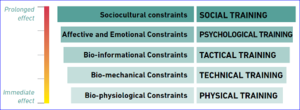
Clearly those involved in education and coaching of sport and PE and in the training of coaches and teachers need to understand the impact that socio-cultural constraints can have. This leads on to understanding the role that psycho-social elements have in the development of the individual and teams. As seen in the next diagram. This is vitally important to the voluntary coaches and teachers in sport.
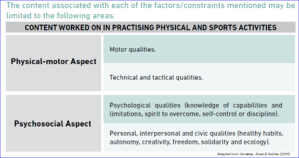
The types of sporting activities may be described in terms of how the practitioners relate to each other. It is through the different forms of interaction that cooperation practices (communication) and opposition (counter-communication) can be carried out which may form the basis for different sporting disciplines, in addition to situations where responsibility is strictly individual.
These forms of communication promote different types of interaction between the practitioners and show the potential for the development of different and more personal or more social values and skills. This approach is summarised in the documents in the diagram below.
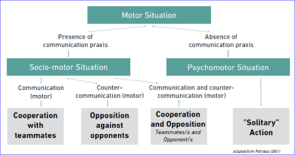
Practical Resources
As well as the white card, PNED has a range of resources to support this work.
For example a contracts/commitment between teachers and students concerning the fulfilment of behaviour goals for both.(See "Pedagogy Resources" at http://www.pned.pt).
“LEDS play”
LEDS Play is a further resource which developed in partnership with “The University of Values” which also has a training module for teachers and coaches that seeks to provide support for teachers, coaches, sporting agents, those responsible for clubs and other educators in carrying out the following objectives with students and practitioners of the most varied sporting disciplines, particularly those who are younger.
The module is based on an Experiential Learning methodology, which represents an enlarged perspective which highlights experiences favouring authentic learning as a necessary basis for the acquisition of important skills for human development and includes the methodological and pedagogic proposals.
You can find different exercise suggestions on the LED on Values Programme website www.ledonvalues.orgas well as on the PNED website www.pned.pt and in more detail which are carried out to develop values in sport and personal, interpersonal and civic skills.
Academic Theories
In the material that PNED has published are some interesting perspectives on the theoretical framework for sports education, much of which is based on the thinking expounded by Gimenez et al (2009)
Sport through education is different to training for elite sport, which is focused on the talent pathway and competitive success.
Citing Seirul., lo (1995), Gimenez suggests we have to ask ourselves what is really educational, the sport itself or the conditions in which it is carried out? We have to be aware that the educational aspects of sports practices are not the benefits acquired at a physical and psychological level, nor the learning of the elements technical - tactics that make it up, but what is really educational are the conditions in which sports learning is carried out, which will lead to the self-structuring of the athlete's personality.
They also interestingly refer to Sibson (1992), who found that traditional sport teaching is essentially instructionrather than education.
Values education should be built into every lesson and session, and also design child centred training rejecting the application of “adult” methods to education through sport.
Transmission of social values
Parlebas (2001) explains that there is communication or motor interaction when the motor behaviour of an individual observably influences that of another or that of several other participants. Motor communication refers to ways of communicating that are observed in certain practices of companions which during games or lessons can be “warnings scenarios”, or when physical movement and communications happen at the same time these are socio-motor practices. Motor communication could be considered as a way a person interacts with others, which manifests itself in a singular way in motor games, sports games, and traditional games. In this regard, it is necessary to emphasize that although there are various forms of verbal communication and non-verbal communication that need to be addressed.
References
European Commission https://eacea.ec.europa.eu/national-policies/en/content/youthwiki/73-sport-youth-fitness-and-physical-activity-portugal accessed Jan 20 2020
Parlebas, Pierre (2001) JUEGOS, DEPORTE Y SOCIEDAD. Léxico de praxiología motriz, Paidotribo
Giménez Javier Fuentes-Guerra (2009) Sports teaching from an educational perspectiveWANCEULEN EF DIGITAL
Number 5 - April 2009 https://www.researchgate.net/publication/44283751
Wikipedia 2020 – Portuguese Football Federations https://en.wikipedia.org/wiki/Portuguese_District_Football_Associations
Seirul. Lo, F. (1995). Educational values of sport. In D. Blázquez (Dir). Initiation
sports and school sports (pp. 61-76). Barcelona: I
PNED(2015) Avelar Rosa, Bruno et al Ethics in Sport Guidelines for teachers, Research gate
https://www.researchgate.net/publication/277309862_Ethics_in_Sports_-_Guidelines_for_Teachers
PNED(2015) Avelar Rosa, Bruno et al Ethics in Sport Guidelines for coaches, Research gate
https://www.researchgate.net/publication/277310040_Ethics_in_Sport_-_Guidelines_for_Coaches
08.06.2020

